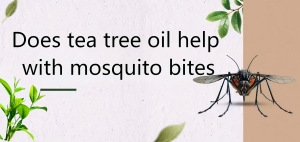Does tea tree oil help with mosquito bites

Have you ever been out enjoying a summer evening only to end up scratching at itchy mosquito bites? It's a common frustration, and many folks turn to natural remedies for relief. One popular option that's been buzzing around is tea tree oil. Derived from the leaves of the Melaleuca alternifolia plant native to Australia, this essential oil has a reputation for its soothing properties. But does it really help with those pesky mosquito bites? Let's dive into what the science and real-world experiences say, exploring how it might ease the discomfort and why it's worth considering in your bug-bite toolkit.
What Exactly is Tea Tree Oil?
Tea tree oil isn't just some trendy essential oil; it's been used for centuries by indigenous Australians for its medicinal qualities. Extracted through steam distillation, it contains compounds like terpinen-4-ol that give it strong antimicrobial and anti-inflammatory effects. When it comes to mosquito bites, people often reach for it because it can potentially reduce swelling and itching without harsh chemicals. Think of it as nature's way of fighting back against those irritating red bumps that ruin your day.
How Does Tea Tree Oil Tackle Mosquito Bites?
The magic happens thanks to its natural antiseptic properties. Mosquito bites can get infected if you scratch them too much, leading to more pain and even scarring. Tea tree oil steps in by killing off bacteria on the skin's surface, which might prevent that from happening. Plus, its cooling sensation can numb the itch almost right away, giving you that much-needed break from constant scratching. From what users share online and in studies, applying a diluted version right after a bite can make a noticeable difference in how quickly the irritation fades.
Key Benefits for Itchy Bites
One big perk is its ability to calm inflammation. Mosquito saliva triggers your body's immune response, causing redness and swelling, but tea tree oil's anti-inflammatory compounds can dial that down. It's also super versatile—you can mix it into lotions or use it in a spray for on-the-go relief. Many parents swear by it for kids' bites since it's gentler than some over-the-counter creams loaded with steroids. And let's not forget, it's affordable and easy to find at most health stores or online, making it a go-to for anyone preferring natural alternatives.
Safe Ways to Apply Tea Tree Oil
Don't just slap it on straight from the bottle, though—that could irritate your skin further. Always dilute it with a carrier oil like coconut or jojoba, aiming for about 5-10 drops of tea tree oil per ounce of carrier. Dab a small amount on the bite using a cotton swab, and reapply a couple of times a day. For prevention, some mix it into homemade bug repellents with other oils like lavender or eucalyptus. Test a patch on your inner arm first to make sure you don't have a reaction, especially if your skin is sensitive.
Real Stories from Users
I've heard from hikers and campers who keep tea tree oil in their first-aid kits, claiming it works wonders on fresh bites during outdoor adventures. One friend told me she used it on a nasty bite that was starting to swell, and within hours, the puffiness went down without needing antihistamines. Online forums are full of similar tales, where people compare it favorably to calamine lotion. Of course, results vary—some bites heal faster than others—but the consensus seems positive for mild cases.
Potential Drawbacks to Watch For
It's not all smooth sailing; tea tree oil can cause allergic reactions in some people, leading to rashes or burning sensations. If you're pregnant, nursing, or have pets around (it's toxic to cats and dogs), steer clear or consult a pro first. Overusing it undiluted might dry out your skin, so moderation is key. Remember, while it's great for minor bites, it's no substitute for medical advice if things get worse.
Comparing It to Other Remedies
If tea tree oil isn't your thing, there are plenty of alternatives like aloe vera gel for cooling relief or baking soda pastes to draw out the itch. Hydrocortisone creams from the pharmacy offer quick anti-inflammatory action, but they might not appeal if you're avoiding synthetics. Essential oils like peppermint or chamomile can pair well with tea tree for a boosted effect. Ultimately, what works best often comes down to trial and error with your own skin type.
When Bites Need More Than Home Remedies
Sometimes, a mosquito bite is more than just annoying—it could signal an allergic reaction or infection. If you notice severe swelling, fever, or the bite spreading, it's time to see a doctor. In areas with mosquito-borne diseases like West Nile or Zika, don't rely solely on oils; use proven repellents and get checked if symptoms persist. Tea tree oil can be a helpful ally, but knowing your limits keeps things safe.
Incorporating It Into Your Routine
Why not make tea tree oil part of your summer survival strategy? Stock up on a quality, pure version and experiment with DIY mixes. Blend it with witch hazel for a soothing spray or add to your bath for all-over relief after a buggy day. Over time, you might find it reduces how often you reach for chemical-laden products, giving your skin a natural breather. Just like any remedy, consistency and proper use make all the difference in seeing real results.
